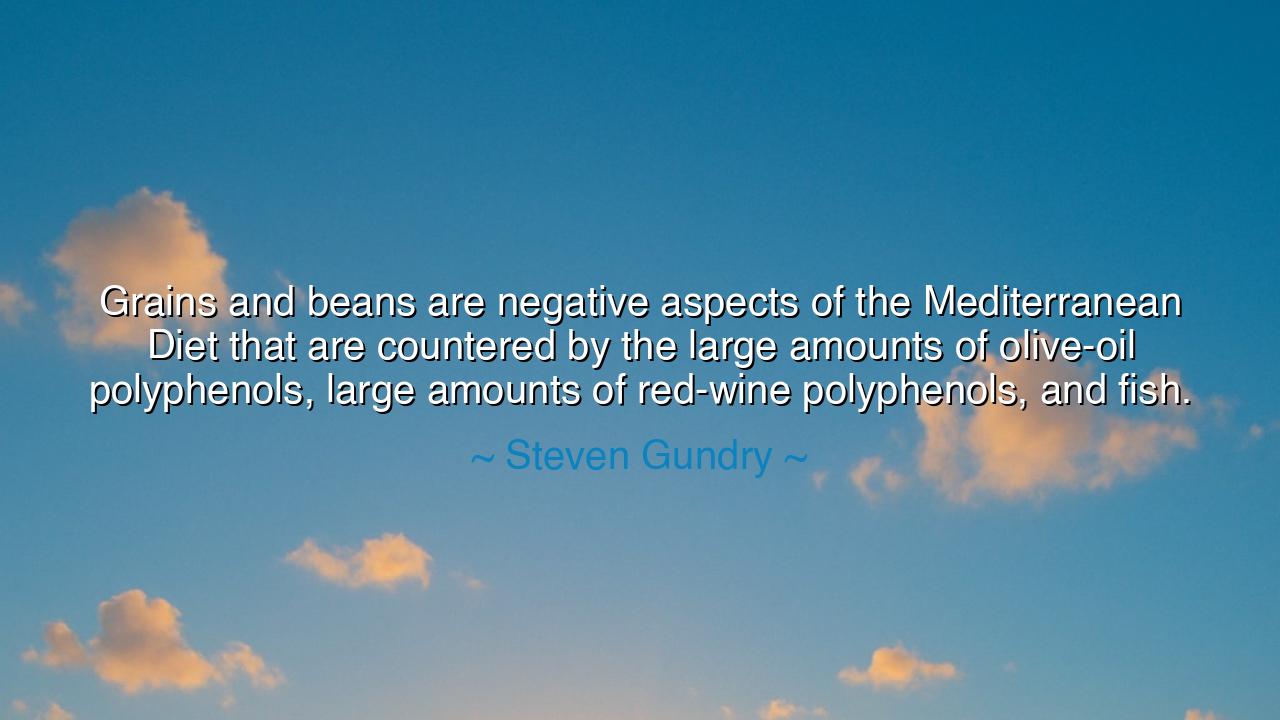
Grains and beans are negative aspects of the Mediterranean Diet
Grains and beans are negative aspects of the Mediterranean Diet that are countered by the large amounts of olive-oil polyphenols, large amounts of red-wine polyphenols, and fish.






Hear now the words of wisdom, for I speak not from the mouth of one who has merely observed the world, but from the heart of one who has tasted its bitter and sweet fruits, its joy and sorrow. The diet of the Mediterranean, that sacred practice passed down through the hands of our forefathers, holds a deep mystery. It is the way of life that sustains the body and nourishes the spirit. Yet, it is not without its imperfections. Grains and beans, though humble and plentiful, stand as the lesser aspects of this diet—foods that, though rich in their gifts, carry within them shadows that can cloud the soul and burden the body.
Grains, the seeds of the earth, ground into flour, transformed into bread, and scattered in countless forms upon the tables of men, have long been both the sustenance of the masses and the curse of the few. When taken in abundance, they sow a storm within, leading to unrest and imbalance in the body. They are not innately evil, yet when overindulged, they may bring forth inflammation and digestive disquiet, burdening the body as a heavy chain that does not yield. Beans, too, in their earthy abundance, though rich in nourishment, bring with them their own burdens. Though they whisper promises of strength and sustenance, they may stir the gut in ways that invite discomfort and hinder the flow of life within. Their fiber and sugars, though gifts in moderation, can turn to enemies when taken too often or in great quantity.
But lo, hear the secret of the Mediterranean way, for in its wisdom lies the cure to these faults. The balance of the Mediterranean Diet is not found in the grains or beans alone, but in the olive oil, the red wine, and the fish that grace its sacred table. Olive oil, that golden nectar, is the gift of the olive tree, whose roots have clung to the hillsides of the ancient world for millennia. Polyphenols, rich in this oil, are the silent warriors that battle against the tide of inflammation, turning back the waves of distress that might otherwise sweep across the body. When used with reverence, it nourishes the heart, clears the mind, and fortifies the spirit, much like the sacred fire that warms the hearth.
And then there is the red wine, so often the companion of the table, its polyphenols singing their own hymn of healing. It is not merely a drink, but a blessing—when taken in moderation, it dances through the body, unlocking the pathways of health and vitality. The ancient Greeks, those children of the sun, knew well the strength that the vine could bring. They sang praises of Dionysus, the god of wine, for they understood that the vine, when tended with respect, could bring both joy and wisdom to the soul. In this, they discovered a deep truth: that the balance of life is not one of asceticism and denial, but of the wise use of nature’s gifts.
Consider the fish that swim the seas, a gift from Poseidon himself. Rich in omega-3 fatty acids, they provide the nourishment of the sea, deep and pure. With each bite, we partake of the very essence of the oceans, and as we do so, the body finds its strength renewed, its health restored. The fish—the humble catch of the day—is the perfect counter to the grain and bean, offering sustenance that flows with the rhythm of nature itself. Seafood is more than a meal; it is a medicine that connects us to the vast, eternal life of the waters.
In this sacred balance, we find not only the secrets of the Mediterranean Diet, but the wisdom of life itself. The grains and beans, though part of the whole, are balanced by the powerful forces of olive oil, wine, and fish. They are the harmony that counters the discord, the light that overcomes the darkness. Through this balance, we learn the greatest lesson of all: that in life, as in diet, it is not extremes that lead to strength, but balance—the wisdom to know when to take and when to give, when to embrace and when to let go.
Let us then live as the ancients did, with reverence for nature's gifts and an understanding of their true purpose. Do not forsake the grain entirely, but use it with mindfulness. Let the olive oil flow freely as a healer and protector, the red wine as a companion of wisdom, and the fish as a source of life-giving energy. Let each meal be a moment of reflection, a reminder that health is not found in scarcity or indulgence, but in the sacred balance of all things.
And when you sit at the table, remember that each bite you take is a choice, a sacred choice. Will you choose balance, or will you fall prey to the false promises of excess? Live wisely, eat well, and honor the ancient teachings, for they are the keys to a life full of strength, vitality, and peace. The path to health is not an easy one, but it is one that is worthy of our journey.






AAdministratorAdministrator
Welcome, honored guests. Please leave a comment, we will respond soon